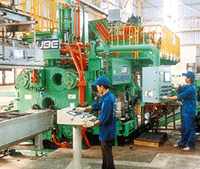 VietNamNet
VietNamNet
Vietnamese businesses lack sci-tech strategies
A ‘disease’ of Vietnamese businesses is their sluggishness and dependence on state subsidies. This is the major hindrance to the development of science and technology, experts say.
Dr. Hoang Tran Hau from the Union of Scientific and Technological Associations of Vietnam said most enterprises, both state and private, are waiting for the state’s assistance to invest in science and technology.
According to a research work entitled “Solutions to raise and use financial sources for sci-tech research in Vietnamese businesses”, up to 80% of surveyed businesses didn’t have a sci-tech investment strategy; 63.45% (125/197) were awaiting state assistance; 20.8% were investing in sci-tech with bank capital; and 15.7% were investing in sci-tech with their own profit.
The research work also shows that 41% of businesses that are interested in sci-tech investment say that benefit from sci-tech investment is unclear, 37% say investment in sci-tech is mostly ineffective and 22% recognise the benefits of sci-tech investment.
Meanwhile, within six years, from 2002 to 2007, the Ministry of Science and Technology received requests from 500 enterprises for funding to renovate science and technology. However, only 111 of them were approved, totalling VND105.819 billion ($6.22 million). Of them, there were only 51 non-state enterprises, which received VND45 billion ($2.5 million).
Dr. Nguyen Tuong Van, from the Ministry of Industry and Trade, said these enterprises received only 30% of the total funding they needed. Most of them were small- and medium-sized enterprises so it was very difficult for them to raise the remaining 70% of capital for technological renovation.
The above statistics show that Vietnamese enterprises are dependent on the state to renovate technology. This keeps them in the nether regions of science and technology.
Stimulus needed
A representative of the Ministry of Science and Technology said the national technology renovation programme targets small- and medium-size enterprises which have outdated technology and can’t afford to renovate technology themselves.
The programme will raise capital from various sources to help these enterprises change their technology. The state will provide one-third of the capital. The programme aims to raise the percentage of enterprises that have research and development divisions to 1-5%.
The representative said through this programme, the state will give a stimulus to small- and medium-size enterprises to modernise their technology. Enterprises will have to do this job themselves, with the assistance of the state.
The Chief of the Ministry of Science and Technology’s Office, Tran Viet Thanh, said this programme will provide preferences for enterprises to change their technology through providing preferential corporate income tax rates for enterprises applying new technology, allowing them to use 50% of after-tax income for 3 years to invest in sci-tech, etc.
Experts believe that this programme will urge local enterprises to pay more attention to technology renovation.

 Previous page
Previous page Back to top
Back to top







